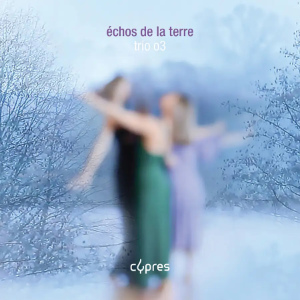
Échos de la terre
Fabian Fiorini (b.1973)
Glowing hearts of the deep white nympheas (2021)
Tõnu Kõrvits (b.1969)
I Solano (2003)
Kaija Saariaho (1952-2023)
Cendres (1998)
George Crumb (1929-2022)
Vox Balaenae (1971)
Trio O3
rec. 2023, Arsonic, Mars-Mons arts de la scène, Mons, Belgium
Cyprès CYP4664 [52]
This is a rather eclectic mix of contemporary repertoire which nevertheless works well together and holds my interest without any problem. The title of this album, Echoes of the Earth, is reflected in the choice of repertoire which is inspired by the elements of Light, Air, Fire, and Water. The first piece, Glowing hearts of the deep white nympheas by Fabian Fiorini, is a dreamy work, with some beautiful textures inspired by Monet’s painting of water lilies and his way of focusing on the moods created by the various different reflections of light. There is an especially beautiful passage, referencing the Crumb work later in the disc, where the flute player sings into the flute creating a remarkable moment of idyllic brightness.
Representing Air is Tõnu Kõrvits and his composition I Solano which flows almost seamlessly from one texture to the next. It is a subtle but effective work which is supposed to portray three young people watching the wind on the sea and being struck by the realisation that all beauty is temporary. The trio has an excellent grasp of the various effects and odd timbres that the composer asks for; in fact, it seems to be no less normal for them than playing Brahms or Schubert – which is quite an achievement.
Kaija Saariaho’s Cendres (ashes) is the third work on the disk and you can immediately hear the swirl of hot ash as it flutters into the air in plumes of smoke, blown about in dying flames. The work is mostly concerned with sonority and movement and it very aptly describes in aural terms the many random and intricate movements of, and found within, a fire.
The best-known and most recorded work on the album is George Crumb’s Vox Balaenae. Crumb wrote this work after hearing recordings of whale calls and uses the instruments in a very convincing manner to imitate these sounds, as well as creating a narrative about the conflict between humanity and the natural world. It is a work not only concerned with whales, but with the sea and planet as a whole, and there is the obvious quotation from Richard Strauss’ Also sprach Zarathustra a few minutes in that confirms this idea of conflict between civilisation and nature. It is the only work on the disc where I am familiar with other interpretations and this is really as good as any. My personal preference lays with the premiere Sony recording (Sony 88883749332) which I find maybe a touch more characterful and with a few added subtleties, but this recent version may well be even more skilfully executed.
The sound is very good, full, maybe just a little too resonant in the lower register which can distort a little, and recorded at a high volume so you don’t have to worry about turning your volume up. All in all, it’s hard to be disappointed with a disc which combines interesting repertoire, great performances, and great sound. More of this, please.
Morgan Burroughs
If you purchase this recording using a link below, it generates revenue for MWI and helps us maintain free access to the site



Performers
Eugénie Defraigne (cello), Léna Kollmeier (piano), Lydie Thonnard (flute)

















